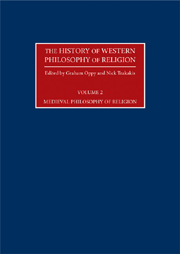Book contents
- Frontmatter
- Contents
- Editorial Introduction
- Contributors
- 1 Medieval Philosophy of Religion: An Introduction
- 2 Boethius
- 3 Johannes Scottus Eriugena
- 4 Al-Farabi
- 5 Avicenna (Ibn Sina)
- 6 Anselm of Canterbury
- 7 Al-Ghazali
- 8 Peter Abelard
- 9 Bernard of Clairvaux
- 10 Averroes (Ibn Rushd)
- 11 Moses Maimonides
- 12 Roger Bacon
- 13 Thomas Aquinas
- 14 John Duns Scotus
- 15 William Ockham
- 16 Gersonides
- 17 John Wyclif
- 18 Nicholas of Cusa
- 19 Erasmus of Rotterdam
- Chronology
- Bibliography
- Index
19 - Erasmus of Rotterdam
- Frontmatter
- Contents
- Editorial Introduction
- Contributors
- 1 Medieval Philosophy of Religion: An Introduction
- 2 Boethius
- 3 Johannes Scottus Eriugena
- 4 Al-Farabi
- 5 Avicenna (Ibn Sina)
- 6 Anselm of Canterbury
- 7 Al-Ghazali
- 8 Peter Abelard
- 9 Bernard of Clairvaux
- 10 Averroes (Ibn Rushd)
- 11 Moses Maimonides
- 12 Roger Bacon
- 13 Thomas Aquinas
- 14 John Duns Scotus
- 15 William Ockham
- 16 Gersonides
- 17 John Wyclif
- 18 Nicholas of Cusa
- 19 Erasmus of Rotterdam
- Chronology
- Bibliography
- Index
Summary
The subject of this chapter, Erasmus of Rotterdam (c.1467–1536), was an anomaly in his own time, and remains so even today in the history of European thought. Most of Erasmus' important legacy is unacknowledged, as it was absorbed into classical and biblical scholarship, merged into the common literary heritage of the West, or was simply opaque to adherents of the theological and philosophical schools that developed in the immediate aftermath of the Reformation. Nevertheless, the growth of ecumenical dialogue, like the widespread interest in rhetorical expressions of religious conviction and sentiment, has led inevitably in our time to a reappraisal of the place of Erasmus in our culture. This chapter will deal briefly with his origins and the evidence for his early intellectual formation, then consider his humanism, the stated agenda of his life work, and the personal blend of religious and philosophical influences that found expression in a highly idiosyncratic if enduring understanding of the legacy of the Gospels.
ORIGINS AND EARLY FORMATION
Erasmus was born in Rotterdam in the late 1460s (Augustijn 1991: 21–4; Tracy 1996: 17–24). Little is known of him with certainty before his ordination to the priesthood in 1492. He was illegitimate, born probably into an extended family of some means, and while the exact date of his birth remains a subject of debate, c.1467 is widely accepted.
He and his brother Pieter (possibly a half-brother) were schooled in Gouda and later, about 1475, in Deventer at the school of the chapter of Saint-Lebuin, a place of high reputation. Later the brothers, orphaned by now, lived in a poor students’ hostel run at ’s- Hertogenbosch by the Brethren of the Common Life, whose pietism may be assumed to have influenced Erasmus to at least some degree, although he was later capable of excoriating criticism of the Brethren themselves. At any rate, first his older brother, Pieter, and in 1487 Erasmus himself, joined the Canons Regular of Saint Augustine, Pieter at Sion, near Delft , and Erasmus at Steyn, near Gouda.
- Type
- Chapter
- Information
- The History of Western Philosophy of Religion , pp. 251 - 262Publisher: Acumen PublishingPrint publication year: 2009

